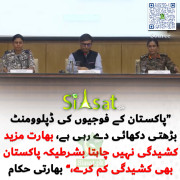
راولپنڈی کی انسداد دہشت گردی کی عدالت میں بانی پی ٹی آئی کے وکلاء کو ملاقات کی اجازت نہ دینے کیخلاف دائر درخواست پر سماعت ہوئی۔ اس دوران عدالت نے متعلقہ حکام کے خلاف ایک اہم قدم اٹھاتے ہوئے سی پی او، ایس ایس پی اور نیو ٹاؤن کے تفتیشی افسر کو توہین عدالت کے نوٹس جاری کردیئے ہیں۔
عدالت نے تینوں افسران کو حکم دیا ہے کہ وہ کل تک اپنا جواب جمع کرائیں تاکہ اس معاملے کی مزید تحقیق کی جا سکے۔ یہ صورتحال اس بات کی عکاسی کرتی ہے کہ عدالت انتہائی سنجیدگی سے وکلاء کے حقوق اور قانونی پروسیس کا احترام کرنے کے معاملے کو دیکھ رہی ہے۔
عدالت کا یہ اقدام اس طرح کے معاملات میں وکلاء کی حیثیت و حقوق کی حفاظت کے لیے ایک قدم ہے، اور اس پر قانونی حلقوں میں مختلف آراء سامنے آ رہی ہیں۔ اس کیس کی تفصیلات کا انتظار ہے تاکہ معلوم ہو سکے کہ حکام عدالت کے نوٹس کا کیا جواب دیتے ہیں۔
- Featured Thumbs
- https://i.postimg.cc/vH20rmgR/IKTerror.jpg































